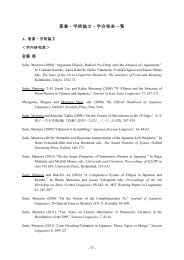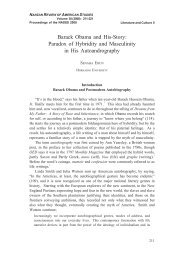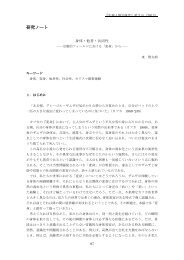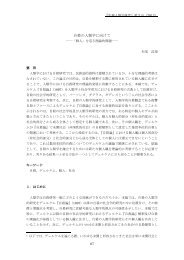INTRA- AND INTER-RELIGIOUS DIALOGUE IN ... - 南山大学
INTRA- AND INTER-RELIGIOUS DIALOGUE IN ... - 南山大学
INTRA- AND INTER-RELIGIOUS DIALOGUE IN ... - 南山大学
Create successful ePaper yourself
Turn your PDF publications into a flip-book with our unique Google optimized e-Paper software.
南 山 大 学 アジア・ 太 平 洋 研 究 センター 報<br />
第 7 号<br />
to an endless debate. The government also organised a meeting for religious<br />
leaders in Jakarta, but ultimately they could not reach a substantive agreement.<br />
Mukti Ali was apparently considered the most appropriate man to solve the<br />
problem of inter-religious tensions in the country.<br />
One of the programs under Mukti Ali’s administration was the religious<br />
harmony project (proyek kerukunan). The project was generally designed to<br />
create harmonious relations among religious leaders, and to support the<br />
government’s development projects (modernization). Some of the programs in<br />
the project were dialogues for religious leaders, camping for students of<br />
tertiary religious institutions, and social research on inter-religious relations in<br />
different places of Indonesia. Mukti Ali suggested that inter-religious dialogue<br />
should be based on agreement to disagree. In fact, Mukti Ali’s dialogue<br />
programs tried to avoid sensitive issues like theological differences. The simple<br />
target was to help the leaders of religious groups (or the potential leaders in<br />
the case of university students) to know each other, and to support<br />
government’s efforts to modernize the country.<br />
Mukti Ali was then replaced by Alamsjah Ratu Perwiranegara in 1978.<br />
Alamsyah, a military man, was previously a private assistant to President<br />
Soeharto. He was actually the man behind the first inter-religious dialogue in<br />
Indonesia called Musyawarah Antaragama (Inter-religious Consultation) held in<br />
November 1967. Alamsjah continued the religious harmony project during his<br />
term in office. As an army general, he was apparently able to obtain more<br />
funding to run the program. However, he actually did not believe in the<br />
effectiveness of dialogue to establish inter-religious harmony. Inter-religious<br />
harmony, for him, could only be attainted if religious groups were controlled<br />
by regulations. Because the regulations were generally in favour of the Muslim<br />
majority, the minorities, especially the Christians, were opposed to them. In the<br />
eyes of the Christian minorities, Mukti Ali was preferable to Alamsjah.<br />
Nonetheless, it was Alamsjah who proposed the trilogy of harmony, namely<br />
―<br />
4<br />
―
















